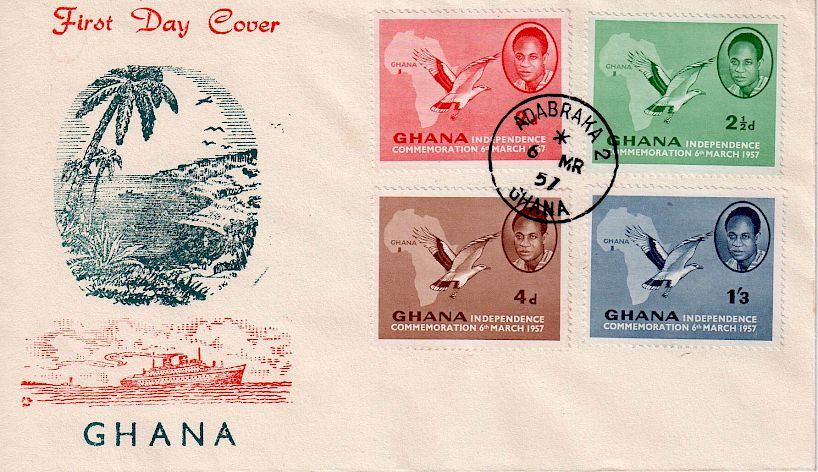What We're Reading This Week

Kenneth Wilburn, https://www.ecu.edu/african/sersas/NkrumahEraPhilately.htm
Sean Phillips
Sa'eed Husaini, “The Anti-Colonial Revolution: An interview with Adom Getachew,” Tribune Magazine
In this piece, Sa'eed Husaini interviews Adom Getachew who is Assistant Professor of Political Science at the University of Chicago. They discuss the key themes, motivations, and findings of Getachew's research into the “black and African anti-colonial and nationalist thinkers and statesmen” who engaged in their own forms of “worldmaking” from the early to the mid-twentieth century, explored in detail in her recent work Worldmaking after Empire: The Rise and Fall of Self-Determination.
Bernadette Carreon and Ben Doherty, “Future of Pacific Islands Forum in doubt as Palau walks out,” The Guardian
Palau recently claimed it would be departing The Pacific Islands Forum in protest at the election of the former Cook Islands prime minister, Henry Puna, as secretary general. In a move which went against the “gentleman’s agreement” (whereby the position rotates between representatives from Polynesian, Melanesian, and Micronesian representatives), the election of a Polynesian representative in the year that it would ordinarily have been filled by a Micronesian one “exposed a deep fracture between north and south Pacific nations.”
“Repressive regimes are tightening their grip on their citizens abroad,” The Economist
Whilst “extraterritorial repression” is nothing new, this piece argues that it is becoming increasingly commonplace. The think-tank Freedom House claims that a rise in “transnational repression” has gone hand in hand with the global rise of authoritarian regimes and the “disinclination of the previous American administration to advocate human rights.”
Nicholas Sy
Gerhard de Kok, Doorzoek koloniale archieven!
Gerhard de Kok, historian and programmer, launches a search engine for manuscripts from the Dutch East India Company, the West India Company, the Suriname Society, and the Berbice Society automatically transcribed by the National archives of the Netherlands using the software Transkribus HTR.
Margaret Makepeace, “East India Company instructions for keeping records,” British Library
Margaret Makepeace writes about ciphers, ruled paper, journals, and on the need to note down everything immediately because death could strike at any time in her piece on the East India Company’s instructions for keeping records.
Pablo Bujalance, “Esther Cruces, nombrada directora del Archivo General de Indias,” Diario de Sevilla
Esther Cruces is the new director of the Archivo General de Indias, as Pablo Bujalance reports. For Cruces, an immediate part of her mission is to awaken the public’s interest in the archive’s manuscripts.
Fernando Gómez Herrero
G. John Ikenberry. 2020. A World Safe for Democracy: Liberal Internationalism and the Crises of the Global Order. Yale University Press.
This is an ambitious work by a visible and influential figure in the field of international relations (IR), foreign affairs, and U.S. foreign policy. It tackles the publicists of the British Empire, the “intelligencers” of IR in the vicinity of the Versailles Peace Treaty, think-tank environs in post-WWI, Woodrow Wilson’s moment of “glory,” FDR, and the 1980s onwards. There is a bit of mea culpa for the wrong doings of the U.S., but not an awful lot. Ikenberry does not shy away from universalisms and global world orderings always holding tight the banner of liberal tradition—he is no neo-liberal. Toynbee Prize Foundation will publish an excerpt of my interview with the author.
Peter Davidson. 2007. The Universal Baroque. Manchester University Press
Unlike cream and tea or the Beatles and Liverpool, British Baroque is no automatic association that comes naturally to the British-born historical imagination, but things may be changing. Peter Davidson tackles issues of hybridity and mestizaje, letters in Latin of British expatriates in the vicinity of the Jesuit Order during the violence of the Civil War, musical forms in Guaraní environments, and visual arts in Sucre, Macao and New Spain. He uses the Society of Jesus to present a wild cornucopia from a geographical range that is both vast and immensely challenging.
José Ortega y Gasset. 1973. An Interpretation of Universal History, trans. Mildred Adams. W.W. Norton and Company.
Ortega takes Arnold J. Toynbee's opus, A Study of History, to court for a final verdict of guilty. This public intellectual from Madrid engages with the English historian at the peak of his fame—writing tense historiography amidst a mixed audience and a not-so-benign press in the para-institutional field of the “humanities” during early Franco Spain. Both Ortega and Toynbee are missing in action in current debates about global history. Big creatures (civilizations) and smaller creatures (cultures) continue roaming the vast and disorienting landscapes of an expansive world. These two ghosts deserve to be brought back to the discussion table.